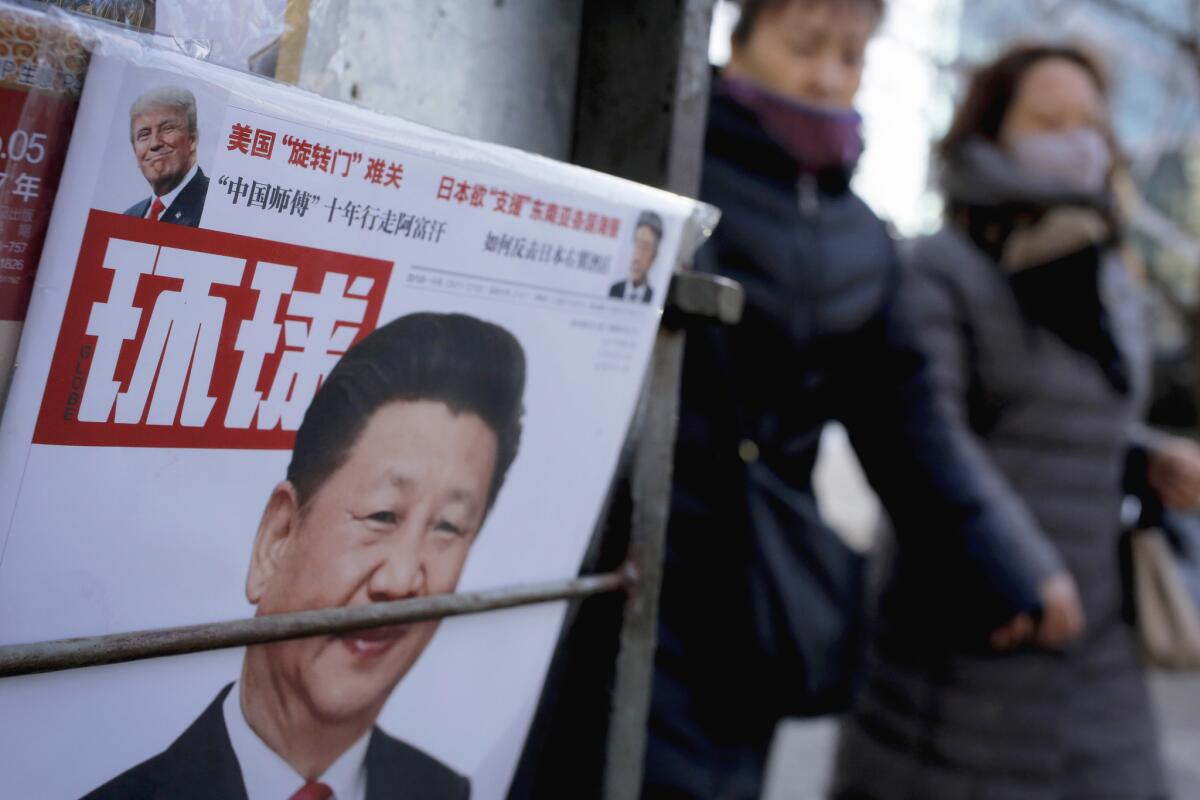Trump’s tardy new year’s greeting to China doesn’t faze Beijing

The letter wishing “the Chinese people a happy Lantern Festival and prosperous Year of the Rooster” was sent late — four days after the Chinese New Year holiday officially ended.
But the Chinese government didn’t seem to mind.
It portrayed the letter, from President Trump to President Xi Jinping, as a sign of detente in a relationship that has grown tense since Trump was elected.
“We highly praise” the letter, China’s foreign affairs spokesman, Lu Kang, said Thursday. “As President Xi pointed out, China and the U.S. shoulder special responsibilities to maintain world peace, stability and prosperity.”
Trump has not been kind to China.
He has accused it of manipulating its currency, supporting North Korea’s leader Kim Jong-Un, economically “raping” the U.S. and creating “the concept of global warming” as a hoax to undercut U.S. manufacturing.
He also offended Beijing by breaking longstanding protocol and holding a phone call with the president of Taiwan, over which China has claimed sovereignty since the Chinese civil war of the 1940s.
Though Trump has spoken by phone with more than a dozen other world leaders since his Jan. 20 inauguration, his only conversation with Xi took place in November, a week after the election.
Trump’s top advisor on trade is Peter Navarro, a hawkish business professor at UC Irvine who directed a documentary called “Death by China.”
And his secretary of State, Rex Tillerson, told the Senate during his confirmation hearing that China should be denied access to artificial islands that it built in contested waters of the South China Sea.
“If Trump’s diplomatic team shapes future Sino-U.S. ties as it is doing now, the two sides had better prepare for a military clash,” the state-run Global Times responded in an editorial.
But the newspaper said that Trump’s letter “has been largely seen as a kindhearted message” — and a sign that the two countries may be moving toward a “reasonable strategic relationship.”
The Trump administration has softened its tone somewhat since the campaign and the transition period.
In a phone call last week with China’s top diplomat, Yang Jiechi, National Security Advisor Michael Flynn “noted that the U.S. government is committed to developing strong U.S,-China relations,” China’s Ministry of Foreign Affairs reported.
Trump’s daughter, Ivanka Trump, attended a Chinese Lunar New Year event at China’s embassy in Washington last week and shook hands with Ambassador Cui Tiankai.
And this week in Tokyo, Trump’s Defense secretary, James Mattis, said that issues in the South China Sea would be “best solved by the diplomats.”
The relationship between the countries stands at a “precarious crossroads,” said a report released Tuesday by a task force of more than two dozen China experts who offered the Trump administration a list of recommendations as it crafts its China strategy.
The administration “appears to be considering policy approaches toward China and Asia that could radically alter the basic strategy that previous Republican and Democratic presidents have pursued for many decades,” the report said.
It said the administration “should recognize that U.S. engagement with China from a principled position of strength in Asia has generally served these interests well and should be continued.”
Shen Dingli, a professor of international relations at Fudan University in Shanghai, said that Trump’s letter signaled a desire for reconciliation and was more effective than a phone call.
“It is better to reach out to China indirectly,” he said. “That’s the reason why he sent a letter.”
Yingzhi Yang and Nicole Liu in the Times’ Beijing bureau contributed to this report.
ALSO
‘One China’ principle not negotiable, China tells Trump
China lashes out at remarks by U.S. Defense Secretary James Mattis on the East China Sea islands
In Asia, China looks like the winner after scuttling of Trans-Pacific Partnership
More to Read
Start your day right
Sign up for Essential California for news, features and recommendations from the L.A. Times and beyond in your inbox six days a week.
You may occasionally receive promotional content from the Los Angeles Times.






